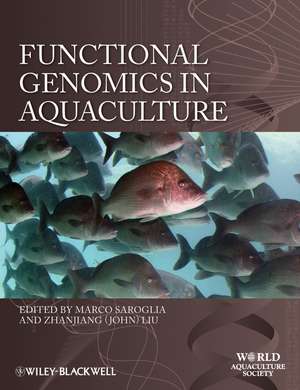Functional Genomics in Aquaculture: World Aquaculture Society Book series
Autor M Sarogliaen Limba Engleză Hardback – 26 iul 2012
Preț: 1088.66 lei
Preț vechi: 1600.47 lei
-32% Nou
Puncte Express: 1633
Preț estimativ în valută:
208.31€ • 226.99$ • 175.54£
208.31€ • 226.99$ • 175.54£
Carte indisponibilă temporar
Doresc să fiu notificat când acest titlu va fi disponibil:
Se trimite...
Preluare comenzi: 021 569.72.76
Specificații
ISBN-13: 9780470960080
ISBN-10: 0470960086
Pagini: 416
Dimensiuni: 189 x 256 x 22 mm
Greutate: 1.02 kg
Ediția:New.
Editura: Wiley
Seria World Aquaculture Society Book series
Locul publicării:Hoboken, United States
ISBN-10: 0470960086
Pagini: 416
Dimensiuni: 189 x 256 x 22 mm
Greutate: 1.02 kg
Ediția:New.
Editura: Wiley
Seria World Aquaculture Society Book series
Locul publicării:Hoboken, United States
Public țintă
Primary Market: Fish geneticists, aquaculture biotechnology researchers, aquaculture industry personnel, fish physiologists, fish biologists; Secondary Market: Students, fisheries industry personnelCuprins
Textul de pe ultima copertă
FUNCTIONAL GENOMICS IN AQUACULTURE
Genomics has revolutionized biological research over the course of the last two decades. Genome maps of key agricultural species have offered increased understanding of the structure, organization, and evolution of animal genomes. Building upon this foundation, researchers are now emphasizing research on genome function. Functional Genomics in Aquaculture looks at the advances in this field as they directly relate to key traits and species in aquaculture production.
Functional Genomics in Aquaculture opens with two chapters that provide a useful general introduction to the field of functional genomics. The second section of the book focuses on key production traits such as growth, development, reproduction, nutrition, and physiological response to stress and diseases. The final five chapters focus on a variety of key aquaculture species. Examples looking at our understanding of the functional genomes of salmonids, Mediterranean sea bass, Atlantic cod, catfish, shrimp, and molluscs, are included in the book.
Providing valuable insights and discoveries into the functional genomes of finfish and shellfish species, Functional Genomics in Aquaculture will be an invaluable resource to researchers and professionals in aquaculture, genetics, and animal science.
ALSO PUBLISHED IN COOPERATION WITH THE WORLD AQUACULTURE SOCIETY:
Aquaculture Biosecurity: Prevention, Control, and Eradication of Aquatic Animal Disease
Edited by: A. David Scarfe, Cheng-Sheng Lee, and Patricia J. O'Bryen
ISBN: 9780813805399
Aquaculture Production Systems
Edited by James H. Tidwell
ISBN: 9780813801261
Genomics has revolutionized biological research over the course of the last two decades. Genome maps of key agricultural species have offered increased understanding of the structure, organization, and evolution of animal genomes. Building upon this foundation, researchers are now emphasizing research on genome function. Functional Genomics in Aquaculture looks at the advances in this field as they directly relate to key traits and species in aquaculture production.
Functional Genomics in Aquaculture opens with two chapters that provide a useful general introduction to the field of functional genomics. The second section of the book focuses on key production traits such as growth, development, reproduction, nutrition, and physiological response to stress and diseases. The final five chapters focus on a variety of key aquaculture species. Examples looking at our understanding of the functional genomes of salmonids, Mediterranean sea bass, Atlantic cod, catfish, shrimp, and molluscs, are included in the book.
Providing valuable insights and discoveries into the functional genomes of finfish and shellfish species, Functional Genomics in Aquaculture will be an invaluable resource to researchers and professionals in aquaculture, genetics, and animal science.
ALSO PUBLISHED IN COOPERATION WITH THE WORLD AQUACULTURE SOCIETY:
Aquaculture Biosecurity: Prevention, Control, and Eradication of Aquatic Animal Disease
Edited by: A. David Scarfe, Cheng-Sheng Lee, and Patricia J. O'Bryen
ISBN: 9780813805399
Aquaculture Production Systems
Edited by James H. Tidwell
ISBN: 9780813801261
Descriere
Genomics has revolutionized biological research over the course of the last two decades. Genome maps of key agricultural species have offered increased understanding of the structure, organization, and evolution of animal genomes. Building upon this foundation, researchers are now emphasizing research on genome function.




